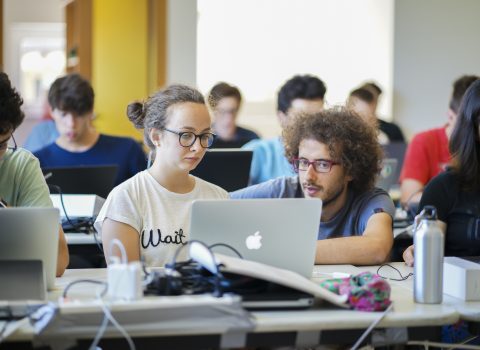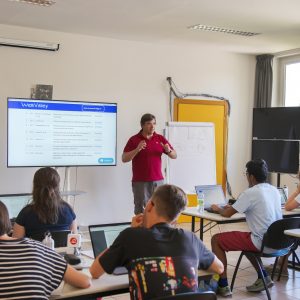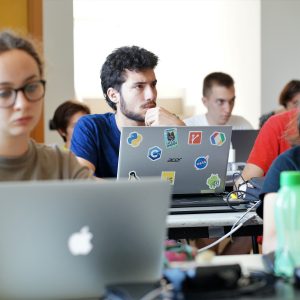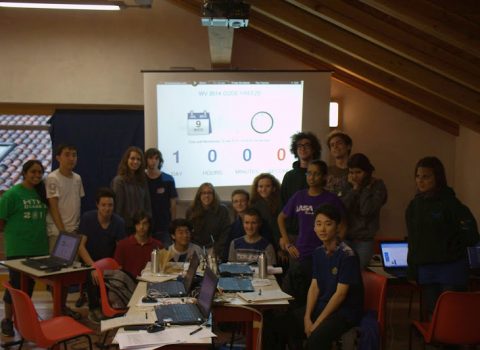
China: starting in 2019 AI will be included in high school curricula
The Chinese government will introduce a book on this topic entitled "Fundamental Principles of Artificial Intelligence" in 40 schools. And how is it going in Italy?
We know now that China’s target is to become a world leader in AI. The roadmap set by the government would lead to reach 150 billion dollars of the industry market by 2030. It is also clear that education is one of the best ways to achieve such ambitious and long-term goals.
It starts like this: a book for high school students about the history of AI and some of its possible applications such as facial recognition, autonomous driving and public safety. A text created by the joint effort of the SenseTime startup – famous for creating the controversial face recognition system used by the government for security purposes – and by the East China Normal University (ECNU).

Fundamentals of Artificial Intelligence (fonte: yoycart.com)
“The AI industry is facing a the lack of professional figures. The publication of the book is a turning point because it brings artificial intelligence out of the ‘ivory tower’ and becomes an integral part of the education of high school students, ” Lin Dahua, a professor at the Chinese University of Hong Kong said. The ‘race’ for the training of young people becomes critical, especially if the estimate of the Chinese government, which foresees a demand for over 5 million AI professionals in the years to come, proves right.
Artificial intelligence is a subject that concerns the future of the global economic system, but China is the first nation to place so much attention on the education aspects, so much so as to include this activity into school curricula. On the other hand, in many countries parallel activities are carried out that encourage high school students to address this issue. FBK, for example, since 2001 has offered high school students an experience of immersion in research with its WebValley Summer Camp on data science and applications in artificial intelligence with a strong ethical dimension such as human and environmental health. And, to offer the opportunity of approaching machine learning even during the school year, the Foundation has set up a new trial version of the camp in Trento schools, through an agreement with the Artigianelli Pavonian Institute of Graphic Arts.

Cesare Furlanello and his class of WebValley students
With WebValley and the new initiatives with Artigianelli, we are trying to convey the message that artificial intelligence is already here, – Cesare Furlanello, Head of Data Science at FBK, explains – with great opportunities for services and solutions that can change society and with risks that should not be dismissed. It is not easy to combine knowledge of the problem with algorithms and mathematical calculations, but the jobs of the future are like this: there’s no clear boundary between exploratory scientific aspects, problem solving of practical issues and specific skills. In general, the new AI solutions are based on the ability to live in a world of data, the winners being those who know how to work in a team and speak the language of the users. The idea is to expose these youths as early as in high school, and offer them new dedicated university choices, such as the new Master Degree in Data Science launched by FBK and the University of Trento. “
There are also many associations and companies nationally that deal with training within the realm of AI. Impactscool is one of these and is very familiar with the topic:

Cristina Pozzi, CEO, Impactscool
“In Italy, we are still behind in this respect – Cristina Pozzi, CEO of the company that deals with education on innovation – says. Many courses on programming for all age levels have been set up in recent years, but there is little on AI. More and more university courses or training courses are being offered by private educational institutions with 2 day-training courses or little more. This means, however, that in order to be part of the game, you have either chosen a specific technical career path, or you have the means to access professional training. In both cases, too many people fall outside the scope of the revolution we are facing. As for young people, for example, we have an orientation issue: they often have not had any contact with these worlds, they do not know their applications and end up making education choices that are not necessarily strategic and reflect their potential. As for those who have already entered the labor market, the problem is more complex: on the one hand, many SMEs do not have the knowledge or the appropriate means to take action in this direction; on the other hand, the employees of companies that adopt AI systems are at risk of losing their jobs as they can be replaced by automated systems. Training must therefore enter companies and schools and, at least at a basic level, be as accessible as possible for everyone. ”

Data Science students @ WebValley
You might wonder then what the possibilities are to compensate for these shortcomings: “Today there are many ways to approach AI online. However, it is essential to speak English well in order to access the most updated and complete ones. I’m talking about the courses available for free on Coursera, Edx or other MOOC. Another means is to get in touch with this world through events or meetings (eventbrite and meetup can be good sources to find the nearest ones). In both cases, dedication, curiosity and rigor are needed to take the study seriously and explore the topic in greater depth. Impactscool organizes meetings in schools, universities and cities across Italy thanks to its local Ambassadors to give a tool to approach the topic in a simple and informative way. ”
Surely China is taking much more tangible actions than our country and Europe as a whole are, but the educational actions initiated by our Foundation and other organizations such as Impactscool, show that there is something concrete in which to hope for the future of the new generations. In the meantime, for those lucky enough to speak the language, we can try to order the Chinese book at the affordable price of 35 Yuan (around 4.5 Euros).



